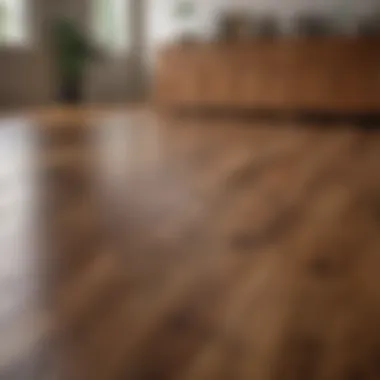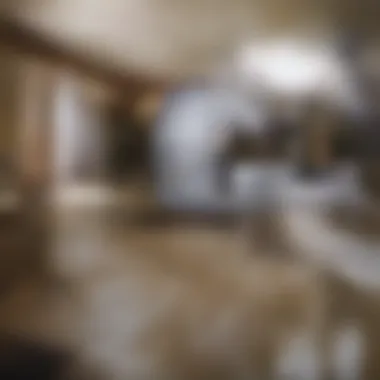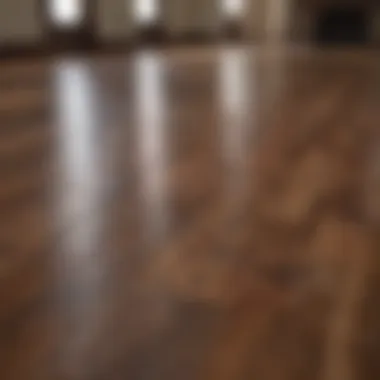Using Vinegar for Cleaning Hardwood Floors Effectively


Intro
Hardwood floors are not only aesthetically pleasing but also offer durability and longevity when properly maintained. However, choosing the right cleaning method is crucial to preserving their beauty. One common solution that many homeowners consider is vinegar. This article examines the effectiveness of vinegar as a cleaning agent for hardwood floors, discussing its properties, interactions with wood finishes, and best practices for its application. Additionally, we will explore expert recommendations and alternative cleaning methods to ensure your hardwood floors remain in pristine condition.
Feature Spotlight
When it comes to maintaining hardwood floors, it is essential to recognize the unique characteristics of both the floors and the cleaning agents used. Vinegar indeed has properties that can aid in cleaning.
Exceptional Architectural Designs
The beauty of hardwood floors often enhances interior spaces significantly. They represent timeless elegance and have been a favorite in various architectural designs, from rustic cabins to contemporary urban homes. Maintaining such floors is critical, as wear and tear can undermine their visual appeal.
Unique Decor Elements
In home decor, hardwood floors complement various styles, whether minimalist or maximalist. Keeping these floors clean and well-maintained using safe products like vinegar can help uphold the design's integrity. The finish of the hardwood affects not only its look but also how different cleaning solutions interact with its surface.
Understanding Vinegar
Vinegar is widely recognized for its natural antibacterial properties, making it a popular choice for many cleaning tasks. However, understanding its composition is key to using it effectively on hardwood floors.
Properties of Vinegar
Vinegar is primarily composed of acetic acid, which can help break down dirt and grime. It is also non-toxic, appealing to those who prefer natural cleaning solutions over chemical-heavy products. Yet, its acidity can be a double-edged sword, especially on hardwood.
Interaction with Wood Finishes
Using vinegar on hardwood floors requires a cautious approach. It can damage the finish over time, leading to dullness and potential deterioration. Therefore, it is paramount to dilute vinegar when using it, ideally combining it with water to reduce its potency.
"Vinegar can be effective, but without careful handling, it can lead to more harm than good on hardwood surfaces."
Best Practices for Cleaning with Vinegar
Employing vinegar safely involves adhering to a few best practices:
- Dilution is crucial: Always dilute vinegar with water, usually one part vinegar to three parts water.
- Avoid soaking: Never soak the floor. Use a damp cloth or mop instead.
- Test an inconspicuous area first: Before applying the solution broadly, check a small area to see how the finish reacts.
Potential Pitfalls
Despite its benefits, there are pitfalls to be wary of when cleaning hardwood floors with vinegar.
- Long-term Damage: Continued use of undiluted vinegar can strip the finish, revealing the raw wood beneath.
- Reacting with Allergens: While vinegar is a natural cleaner, it can trigger allergies for some individuals, especially in enclosed spaces.
Alternative Cleaning Methods
If vinegar proves unsuitable for your hardwood floors, consider these alternatives:
- Mild Soap Solutions: A few drops of dish soap mixed with warm water can effectively clean floors without being abrasive.
- Commercial Cleaners: Many manufacturers offer products specifically designed for hardwood. Brands like Bona and Murphy's Oil Soap are reliable.


Closure
Prolusion to Hardwood Floor Care
Caring for hardwood floors involves more than just regular sweeping. It requires a nuanced understanding of the materials and appropriate cleaning strategies. This article dissects various aspects of hardwood floor care, especially the role of vinegar as a cleaning agent. Homeowners should appreciate the importance of maintaining their flooring, not only for aesthetic reasons but also for the structural integrity of their homes.
When considering care for hardwood floors, one must be cognizant of the unique characteristics of the wood. Different species have varying susceptibility to damage. Understanding this can help guide the selection of appropriate cleaning methods. Accordingly, the next section delves deeper into the basics of hardwood flooring, focusing on material types, finishes, and how they influence cleaning practices.
Overview of Hardwood Flooring
Hardwood flooring is often cherished for its natural beauty and durability. It is typically made from solid wood boards or engineered wood with a veneer of hardwood on top. Common types include oak, maple, cherry, and hickory, each with its distinct properties and aesthetic appeal. Wood finishes, like polyurethane and oil, serve to protect the surface and enhance its appearance.
Because each wood type reacts differently to moisture and cleaning agents, it’s crucial to understand these distinctions before applying any cleaning solution. Regular maintenance will prolong the life of the floor, preserving its value and appearance.
Importance of Proper Cleaning Techniques
Using the right cleaning technique can vastly affect the longevity of hardwood floors. Improper cleaning methods, such as excessive water usage or abrasive cleaners, can lead to warping or dulling the finish. A consistent cleaning routine helps prevent dirt buildup, which can scratch and damage the surface.
Adopting safe cleaning practices is a proactive step. It not only preserves the beauty and value of hardwood floors but also mitigates the risk of costly repairs and refinishing. Homeowners should be informed of the best practices and products to use, ensuring that their cleaning methods align with the needs of their specific flooring type.
The Role of Vinegar in Cleaning
Vinegar is a common household item that serves various purposes, most notably as a cleaning agent. It has garnered attention for its effectiveness against dirt and buildup, particularly on surfaces like hardwood floors. Understanding the role of vinegar in cleaning is essential due to its unique properties and the implications of its use on hardwood surfaces. This section will explore the chemical foundation of vinegar and highlight the numerous benefits that come with its application as a cleaning solution.
Chemical Composition of Vinegar
Vinegar is primarily composed of acetic acid, usually in concentrations around 5-20% in household vinegar. This acid is responsible for several of its cleaning properties. The remaining components consist of water and trace amounts of other substances, including sugars and flavor compounds, which do not significantly influence its cleaning capacity.
When vinegar interacts with dirt or stains, the acetic acid neutralizes alkaline substances. This chemical reaction is crucial for breaking down grime, making it easier to remove from surfaces.
The presence of acetic acid makes vinegar mildly abrasive, which aids in the removal of stubborn residues without scratching or damaging many surfaces. However, the effect of vinegar on specialized coatings or finishes, particularly on hardwood, must be examined closely.
Benefits of Using Vinegar for Cleaning
Vinegar presents several advantages as a cleaning solution. Some notable benefits include:
- Natural Cleaning Agent: Being a natural product, vinegar does not contain harmful chemicals found in many commercial cleaners. This makes it safer for both the environment and individual health.
- Cost-Effective: Vinegar is readily available and inexpensive compared to specialized cleaning products, making it an accessible choice for many homeowners.
- Deodorizing Properties: Vinegar not only cleans surfaces but also neutralizes odors, leaving areas smelling fresh. This aspect is particularly beneficial in rooms like kitchens and bathrooms.
- Bacterial and Viral Removal: While vinegar is not a disinfectant, studies indicate it can reduce some bacteria on surfaces, contributing to a cleaner environment.
- Versatile Application: Beyond floors, vinegar is effective on various surfaces, including countertops, windows, and appliances. Such versatility adds to its appeal as a staple in home cleaning.
Despite these benefits, caution is vital when using vinegar, especially on hardwood floors. It is not universally suitable for all wooden finishes. Homeowners should consider how vinegar may affect their specific flooring to prevent unintended damage.
"Using vinegar wisely can enhance cleanliness, but it requires an understanding of the surfaces in your home."
In summary, vinegar's composition and cleaning benefits make it a compelling option for maintenance in many areas of the home. However, its suitability on hardwood floors warrants a more comprehensive discussion that will be explored in later sections.
Examining the Compatibility of Vinegar with Hardwood Floors
Understanding how vinegar interacts with hardwood floors is crucial for homeowners. The choice of cleaning solution can greatly impact the longevity and appearance of wood flooring. Vinegar, a common household item, is known for its cleaning properties, but its compatibility with hardwood must be carefully considered.


How Vinegar Affects Wood Finishes
Vinegar has acidic properties. This acidity can have a variety of effects on wood finishes. Most hardwood floors are sealed with finishes like polyurethane or varnish to protect them from wear and moisture. When vinegar is applied, it can compromise these finishes over time.
- Finish Deterioration: Repeated use of undiluted vinegar can cause finishes to break down, leading to a dull appearance.
- Water and Vinegar Interaction: Vinegar mixed with water can enhance cleaning without harming the finish if diluted properly. However, an imbalance in the dilution can lead to damage.
- Spot Testing: Always conduct a spot test in an inconspicuous area before applying vinegar across the entire floor. This helps ensure that the finish remains intact.
Potential Risks of Vinegar on Hardwood
Using vinegar for cleaning can present some risks. While it is non-toxic and effective for certain tasks, the following points should be noted:
- Surface Scratching: Vinegar can attract grit and dust, which may scratch the surface of the floor during cleaning.
- Moisture Damage: Excess moisture can be detrimental to hardwood. Vinegar solutions must be applied lightly to avoid soaking.
- Long-Term Effects: Continued exposure to vinegar can lead to warping of the wood and may void some warranties on wood floors.
"Use vinegar sparingly in your cleaning regimen. Maintaining the integrity of the wood is more critical than aggressive cleaning."
In summary, while vinegar can aid in cleaning, attention should be paid to its effects on wood finishes and the overall health of hardwood floors. Using diluted solutions and practicing caution can help mitigate potential risks.
Best Practices for Cleaning Hardwood Floors
Maintaining hardwood floors requires a delicate and informed approach. Using vinegar, while popular due to its natural cleaning properties, must be conducted thoughtfully. Best practices ensure that these techniques enhance the floors’ lifespan without compromising their appearance or stability. Investing in proper cleaning techniques is essential. Not only does it preserve the wood, but it also maintains the aesthetic appeal of your living space.
Safe Dilution Ratios for Vinegar Solutions
When using vinegar to clean hardwood floors, it is crucial to adhere to safe dilution ratios. Pure vinegar is too acidic for wood, which can lead to finish degradation or discoloration. Therefore, finding a balance is essential. A common recommendation is a solution of one part vinegar to ten parts water. This diluted mixture is effective at cutting through grime while being gentle on the finish. Additionally, for a less acidic solution, some homeowners prefer using apple cider vinegar for its milder properties.
- Standard ratio: 1 cup of vinegar for every 10 cups of water
- Alternative: 1 cup of apple cider vinegar for every 10 cups of water
Make sure to test the mixture on a small, inconspicuous area before applying it to the entire floor. This step can prevent potential damage and ensure compatibility with your specific wood finish.
Step-by-Step Guide to Using Vinegar
Using vinegar effectively requires following a simple procedure to achieve optimal results. Here's a step-by-step guide:
- Prepare Your Solution: Mix vinegar with water according to the safe dilution ratio mentioned above. Use a clean bucket for this process.
- Sweep or Vacuum: Before applying any liquid to the floor, ensure that dust and debris are removed. This step prevents scratching the surface during cleaning.
- Dampen a Mop: Use a microfiber mop. Soak it in the vinegar solution, then wring it out thoroughly. A damp mop is effective but avoids excess moisture that can harm hardwood.
- Clean the Floor: Working in sections, mop the floor gently. Avoid soaking the wood; your goal is to use a painless approach to remove any dirt.
- Rinse with Water: After mopping with the vinegar solution, go over the floor with plain water using a fresh mop. This step ensures any vinegar residue is removed from the surface.
- Dry the Floor: Allow the floor to air dry completely. If needed, use dry towels to wipe any remaining moisture.
Following these steps provides an efficient cleaning process that reduces the risk of damaging hardwood floors while enhancing their natural charm. Incorporating these practices into your cleaning regimen ensures that your investment in hardwood flooring remains protected.
Alternative Cleaning Solutions for Hardwood Floors
Cleaning hardwood floors requires careful consideration. While vinegar is a common choice for many, exploring alternative cleaning solutions is essential. Certain products and methods may better suit specific floor types or conditions. Evaluating these alternatives helps homeowners maintain flooring without dissatisfaction.
Commercial Cleaners: Pros and Cons
Commercial cleaners present both advantages and disadvantages. On one side, they often target specific issues like stains or grime removal and claim to protect finishes. Many products feature specialized formulas tailored for different wood types. However, the effectiveness of these commercial products can be inconsistent. Some include harsh chemicals that may damage the natural sheen or even the wood itself.
Pros of Commercial Cleaners:
- Targeted formulas for clear issues
- Quick application process
- Availability at local stores
- Specialized for different wood finishes


Cons of Commercial Cleaners:
- Risk of damage to finishes
- Often contain harsh chemicals
- Can have strong odors
- Higher cost compared to natural alternatives
Natural Alternatives to Vinegar
For those who prefer natural cleaning methods, various options exist. These alternatives are often safer, eco-friendly, and effective. Olive oil mixed with lemon juice, for example, creates a natural wood polish. This mixture enhances shine while providing a light protective layer. Another alternative includes unscented soap diluted in water, which is safe for most hardwood surfaces.
Some other notable alternatives include:
- Baking soda: Excellent for stubborn stains without scratching.
- Castile soap: Gentle and suitable for regular cleaning.
- Essential oils: Adding drops can provide pleasant scent and added antibacterial effect.
Using natural solutions minimizes risks, particularly for homeowners worried about chemicals interactions with wood finishes. They add to the longevity and beauty of the hardwood flooring.
"Choosing the right cleaning solution is critical for maintaining the life and appearance of hardwood floors."
Consulting Professionals for Floor Maintenance
Maintaining hardwood floors can be a complex task that requires both knowledge and experience. Although homeowners may be tempted to tackle the cleaning and restoration themselves, consulting professionals for floor maintenance can provide significant advantages. This section explores the necessity of expert guidance, discussing specific benefits and considerations that can impact the longevity and appearance of hardwood flooring.
When to Seek Expert Advice
There are particular scenarios when it becomes crucial to consult a professional. Major indicators include:
- Signs of Damage: If there are visible scratches, dents, or water damage, it's best to seek expert help. These issues could lead to further deterioration if not handled properly.
- Types of Flooring: Different wood species and finishes require unique care. A professional can identify specific needs that may not be apparent to an untrained eye.
- Restoration Needs: If the finish is dull or wearing off, restoration may be necessary. Experts can provide the right solutions, ensuring that the wood is preserved and its beauty is enhanced.
- Regular Maintenance: For long-lasting results, regular check-ups by a professional can ensure the integrity and appearance of your flooring is maintained over the years.
Understanding Wood Floor Restoration
Wood floor restoration is more than just a quick cleaning. Proper restoration may involve several processes that are best handled by professionals:
- Sanding: This removes old finishes and imperfections, allowing a fresh start. Professionals have the right equipment to do this without damaging the wood.
- Staining: If a new look is desired, staining can completely change the aesthetics of the floor. Pros can help pick the right stain color to achieve desired results.
- Sealing: After restoration, sealing is critical to protect the wood from moisture and stains. A professional ensures the right sealers are used for maximum protection.
- Ongoing Care: Understanding the best cleaning and maintenance routines can significantly increase the life of your hardwood floors. Experts provide tailored advice based on specific floors and local conditions.
"When it comes to maintaining hardwood floors, professional insight is not just advantageous; it can be essential to preserving your investment."
End
The conclusion of this article serves as a critical recap of the key insights regarding the use of vinegar for cleaning hardwood floors. By synthesizing the information presented throughout the article, it helps to clarify the effectiveness and safety of using vinegar in floor maintenance. This summary is important for those who seek to balance cleanliness with the structural integrity of their hardwood flooring.
Summary of Key Points on Vinegar Cleaning
Vinegar emerges as a versatile cleaning agent, but its suitability for hardwood floors comes with caveats. Key points to remember include:
- Chemical Composition: Vinegar is acetic acid mixed with water. Its acidic nature is valuable for breaking down dirt and grime but can be detrimental when used incorrectly on wood finishes.
- Effects on Wood Finishes: While vinegar may clean effectively, it can dull or damage delicate finishes on hardwood. It’s essential to know how your specific floor's finish interacts with vinegar before using it.
- Dilution Matters: Proper dilution ratios are crucial. A common recommendation is using one part vinegar to ten parts water to minimize risk.
- Alternatives: Always consider other cleaning options. Natural solutions such as soap and water or products specifically designed for hardwood can be safer choices.
- Expert Advice: Consulting professionals can provide tailored recommendations that align with the quality and condition of your flooring.
Vinegar can clean effectively, but using it without caution may lead to costly repairs or refinishing.
Final Recommendations for Homeowners
For homeowners considering vinegar as a cleaning agent for hardwood floors, adherence to the following recommendations is advisable:
- Test Before Use: Always perform a patch test on a small area to ensure no adverse reactions occur.
- Follow Proper Dilution: Stick to safe dilution guidelines. The incorrect vinegar concentration can harm wood finishes.
- Use Sparingly: Do not substitute vinegar for routine cleaning. Use it only as needed, perhaps for tougher stains or spot cleaning.
- Explore Alternatives: Consider other commercially available cleaners designed for hardwood. They may offer safer solutions than vinegar.
- Maintain Regular Care: Establish a regular maintenance routine that includes sweeping, dusting, or using a microfiber mop to prolong the life of your hardwood.
In essence, while vinegar can serve as a cleaning solution for hardwood floors, caution and proper techniques are paramount. By fully understanding both the benefits and potential downsides, homeowners can preserve their flooring investments while also maintaining a clean and welcoming home environment.







